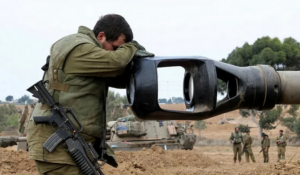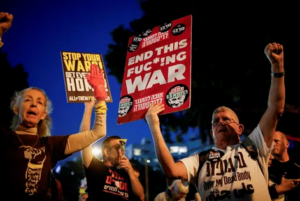I was a West Bank settler. This is why I refused to serve in the IDF

An Israeli soldier rests his head on the gun barrel of a self-propelled artillery howitzer as Israeli soldiers take positions near the border with Gaza in southern Israel
Aharon Dardik writes in Haaretz on 28 April 2025:
Memorial Day is this week. Israel has broken the Gaza cease-fire, killing at least 400 Palestinians after blocking humanitarian aid for over a month now. It seems that Hamas, who, according to reports, has the same number of combatants as they had before October 7, cannot be destroyed through military force. The only thing a continued war will create is more mothers grieving their dead children, and more orphans grieving their dead mothers.
Memorial Day is this week. Across the Jewish world, we are all looking to be with our families and tell our stories. Just as our own stories on these days are diverse, Palestinians observe their Nakba: catastrophe. Many Palestinians were ethnically cleansed and massacred by Israel. Hundreds of thousands of Palestinians were forced out from their homes and forbidden to return. The situation we still find ourselves in today had some of its most painful historical wounds opened and deepened, during this very week.
The current war, pain and grief is the legacy of our inability to reach a peaceful, just path for Israelis and Palestinians to live together in this land. Because of this war, many of us do not even have our whole families with us to observe Memorial Day. Restarting the war has kept Israeli hostages in Gaza. Dozens of Israelis remain in captivity, while thousands of them have been killed. Rather than being able to commemorate the Nakba, thousands more Palestinians remain in Israeli military captivity, while tens of thousands of Palestinians have been killed.
Memorial Day is this week. It is a significant anniversary for me: these were the first days of my conscientious objection to military service in the Israeli Air Force. This is the fourth anniversary of that choice, made right before Operation Guardian of the Walls began.
My commanders initially didn’t believe me when I told them that I was conscientiously objecting. I didn’t fit the expectations of what a refusenik looks like: My family made aliyah from the United States to a settlement in the West Bank. I drafted right after turning 20 years old, because I spent time in yeshiva after I finished my studies at my ultra-right wing high school. I was friendly and easygoing, and I did not have a record of disciplinary issues in high school nor in the military. When I drafted despite my opposition to violence and war, I still believed Israel had the most moral army in the world.
Back then, there was much I did not know about the Israeli Palestinian conflict, the Israeli military and Israeli society. I clung to the right-wing narratives about Israel and about Palestinian aspirations. I hadn’t learned many of the basic realities of the conflict. Despite all of this, I knew the Israeli army’s approach wasn’t adding up, and when the time came I knew I could not serve. At the same time, I was terrified of losing what I had. It seemed far easier to curse the government from the sidelines, grumble about my displeasure with Prime Minister Benjamin Netanyahu and the Israeli right, and collect the social capital of being a minimally compliant soldier, regardless of how I felt.

People take part in a rally against the Israeli government and PM Benjamin Netanyahu and to demand the release of all hostages from Gaza in Tel Aviv
However, when faced with the choice between being a direct participant in the violence of the military and the great unknown of conscientious objection, I felt only one thing was certain: If I took part in combat, I could be responsible for the needless killing of innocent people. If I objected, I knew I myself would not be killed. I could be imprisoned, temporarily, but I would survive. I knew that if I wanted to enter a more hopeful future, I would want people in my situation to value the lives of those they may never meet over their own comfort and over their own narratives. I knew that if I could not overcome my internal struggle and fight for life, I could not expect anything different from Palestinians.
After I objected, having taken that leap, the complexity of the conflict no longer felt paralyzing. It was still just as vast and complex as it was before, but that didn’t mean I couldn’t act. The longer I objected, the longer I acted on my beliefs. Even as I felt conflicted, its internalization became less painful. It didn’t go away entirely: To this day, I feel the pull between dueling narratives, both of which are rooted in truth, even if the conclusions vary greatly. More than anything, that initial step of objecting gave me relief. It clarified that social pressure to conform was keeping me from acting, and the complexity of the situation was just a rationalization I used to justify my complacency.
However, this week, we do have a clear course of action. If you are involved in the IDF at whatever stage – whether you’re a long-time reservist or about to be enlisted – this is the time to conscientiously object.
This government will be using you and your power to harm Israelis, especially the remaining hostages, and harm Palestinians to an even greater extent. Over four hundred Palestinians died on the day the ceasefire was broken. Israel stopped all humanitarian aid into Gaza. These are not righteous actions under any circumstances. There is complexity here, but don’t let that complexity paralyze you.
Memorial Day is this week. In the future when we remember this time, how will we memorialize it? Imagine speaking to your grandchildren in 60 years. When they ask you about today, just before Israel’s 77th birthday, when Netanyahu tried to condemn the Israeli hostages and all of the people of Gaza, imagine what you’ll want to say. Grief can allow anger or apathy to consume us, enabling or assisting more destruction, adding more dead to memorialize. Alternatively, grief can make you resolute and strong, able to stand up even to your countrymen and put an end to further suffering. It can give you the strength to exit the cycle of violence: the choice is yours. Your actions at this time will determine how your family and future generations will remember you.
The contemporary narratives many Jews hold about our people failed us after October 7, and they continue to fail us as we try to understand ourselves and Palestinians. As young Jews, we have the power to shape the Jewish future. We will decide whether Netanyahu, who rose to prominence as an anti-peace activist, and the rest of his ilk, are allowed to lead us into ruin. We will decide whether they sacrifice all of the remaining hostages and untold numbers of innocent Palestinians for their own ends. We will decide whether the Jewish conscience is one that knows when it must grind the war machine to a halt for the sake of every individual on both sides of the conflict.
We have a chance to be stronger than the last generation and send our world down a new, brighter path. The Jews most able to change the course of history will not all be left-wingers born and raised in Tel Aviv, they will be Jews from all over the country and the world. To write ourselves into a future of true independence, we must have young Jews and Israelis from all backgrounds stand up for their values, even when it is scary and difficult.
I still hope for a diplomatic solution to the conflict that allows Jews to live respectfully, safely, equally and lawfully alongside Palestinians from the river to the sea. We are faced with a long journey to get there and this is the first step.
Memorial Day is this week. Four years ago, I refused to serve in the Israeli military any longer. So can you.
Aharon Dardik is an Israeli-American ex-settler, conscientious objector to the Israeli military and nonviolent activist at Columbia University.
This article is reproduced in its entirety
